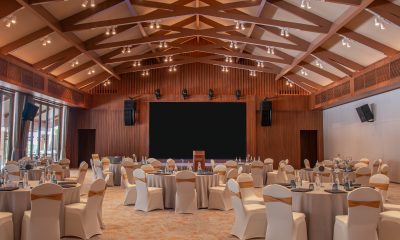International
More patients than beds in Mumbai as India faces surge in virus cases

MUMBAI/NEW DELHI (Reuters) – When Manit Parikh’s mother tested positive for the new coronavirus, she was rushed by ambulance to Mumbai’s private Lilavati Hospital, but officials told the family no critical-care beds were available.
Five hours and dozens of phone calls later the family found a bed for her at the private Bombay Hospital. A day later, on May 18, Parikh’s 92-year-old diabetic grandfather had breathing difficulties at home and was taken to the city’s Breach Candy Hospital, another top private facility, but there were no beds.
“My dad was pleading with them,” Parikh told Reuters. “They said they didn’t have a bed, not even a normal bed.” Later that day, they found a bed at Bombay Hospital but his grandfather died hours later. His test results showed he was infected with the virus.
Parikh said he believes the delays contributed to his grandfather’s death. Officials at Lilavati and Bombay Hospital declined to speak with Reuters. Representatives of Breach Candy hospital did not respond to requests for comment.
For years, India’s booming private hospitals have taken some of the strain off the country’s underfunded and dilapidated public health network, but the ordeal of Parikh’s family suggests that as coronavirus cases explode in India, even private facilities are at risk of being overrun.
India on Sunday reported 6,767 new coronavirus infections, the country’s biggest one-day increase. Government data shows the number of coronavirus cases in the world’s second-most populous country are doubling every 13 days or so, even as the government begins easing lockdown restrictions. India has reported more than 131,000 infections, including 3,867 deaths.
“The increasing trend has not gone down,” said Bhramar Mukherjee, a professor of biostatistics and epidemiology at the University of Michigan, referring to India’s cases. “We’ve not seen a flattening of the curve.”
Mukherjee’s team estimates that between 630,000 and 2.1 million people in India – out of a population of 1.3 billion – will become infected by early July.
More than a fifth of the country’s coronavirus cases are in Mumbai, India’s financial hub and its most populous city, where the Parikhs struggled to find hospital beds for their infected family members.
India’s health ministry did not respond to a request for comment on how it will cope with the predicted rise in infections, given that most public hospitals are overcrowded at the best of times. The federal government has said in media briefings that not all patients need hospitalization and it is making rapid efforts to increase the number of hospital beds and procure health gear.
The federal government’s data from last year showed there were about 714,000 hospital beds in India, up from about 540,000 in 2009. However, given India’s rising population, the number of beds per 1,000 people has grown only slightly in that time.
India has 0.5 beds per 1,000 people, according to the latest data from the Organisation for Economic Co-operation and Development (OECD), up from 0.4 beds in 2009, but among lowest of countries surveyed by the OECD. In contrast, China has 4.3 hospital beds per 1,000 people and the United States has 2.8, according to the latest OECD figures.
While millions of India’s poor rely on the public health system, especially in rural areas, private facilities account for 55% of hospital admissions, according to government data. The private health sector has been growing over the past two decades, especially in India’s big cities, where an expanding class of affluent Indians can afford private care.
Mumbai’s municipal authority said it had ordered public officials to take control of at least 100 private hospital beds in all 24 zones in the city of almost 20 million people to make more beds available for coronavirus patients.
Still, there is a waiting list. An official at a helpline run by Mumbai’s civic authorities told Reuters that patients would be notified about availability.
Shortage of staff
It is not just beds that are in short supply. On May 16, Mumbai’s municipal authority said that it did not have enough staff to operate beds required for patients critically ill with COVID-19, the disease caused by the new coronavirus.
As a result, resident doctors will receive less time off than what is prescribed by the federal government, the authority said. Some medical professionals told Reuters they already are overburdened and treating patients without adequate protective gear, exposing them to a higher risk of infection.
Several hospitals in Mumbai, western Gujarat state, the northern city of Agra and Kolkata in the east have in recent weeks shut partially or fully for days because some medical staff were infected with the virus. The federal government has not reported any deaths of medical staff from the virus.
“In our country, healthcare has never gotten priority,” said Dr Adarsh Pratap Singh, head of the 2,500-strong resident doctors association at New Delhi’s top public hospital, the All India Institute of Medical Sciences. “The government is now realizing the reality, but it’s already too late.”
The AIIMS group has in recent weeks protested about the lack of health gear and publicly rejected Prime Minister Narendra Modi’s call for doctors to donate a part of their salaries to his coronavirus fund.
Some health experts say India’s struggle to treat virus patients is the result of chronic underinvestment in healthcare. The Indian government estimates it spends only about 1.5% of its GDP on public health. That figure is higher than it was – about 1% in the 1980s and 1.3% five years ago – but India still ranks among the world’s lowest spenders in terms of percentage of GDP.
This year, Modi’s federal government raised its health budget by 6%, but that is still short of the government’s own goal of increasing public health spending to 2.5% of GDP by 2025, according to New Delhi-based think tank Observer Research Foundation.
‘Too many patients’
Keshav Desiraju, a former Indian health secretary, said more investment in the health system before the virus outbreak might have made the health system more resilient. “At the times of a crisis, all the holes show up,” he told Reuters.
Dr. Chaitanya Patil, a senior resident doctor at King Edward Memorial government hospital, one of Mumbai’s largest, said the facility had a shortage of medical staff and the 12 coronavirus wards catering to about 500 patients were almost full.
“There are just too many patients coming in,” said Patil, “It is lack of preparedness or a lack of insight of the people planning.”
Last week Rajesh Tope, health minister of the state of Maharashtra, which contains Mumbai, said the lack of hospital beds for critically ill patients will not last long.
“In the next two months, more than 17,000 vacant posts of doctors, nurses, technicians and other health workers will be filled,” he said in a public address.
India’s United Nurses Association, which represents 380,000 medics, took a list of 12 issues they said they are facing – including lack of protective gear and accommodation – to the Supreme Court in April. The court told them they can lodge complaints on a government helpline.
Some nurses are leaving the big cities. Earlier this month, about 300 nurses working at hospitals in Kolkata city left for their hometowns 1,500 km (930 miles) away in India’s remote northeastern state of Manipur. A group representing them said they had left because of irregular salaries and inadequate safety gear, among other issues.
“We love our profession,” said 24-year-old Shyamkumar, who quit his nursing job in one of Kolkata’s hospitals and is planning to head back to Manipur. “But when we are going to work, please give us proper equipment.”
Reporting and photo: Reuters
International
Nika Zorjan’s ‘V Postelji’ music video showcases timeless beauty of Maldives

Released just three weeks ago, Nika Zorjan’s latest music video, ‘V Postelji’ (meaning “In Bed”), has captivated audiences with its stunning cinematography set against the breathtaking backdrop of the Maldives. Directed by videographer Niko Karo, who accompanied Nika to film the video, the project was organised by Moji Maldivi, an agency based in Slovenia dedicated to promoting the Maldives as a premier holiday destination in Balkan region.
The video beautifully captures Nika strolling through serene pathways shaded by iconic coconut palm trees at Villa Park, later walking along the sun-kissed beaches of Villa Nautica, and finally enjoying the golden sunset on a bed at the beach of Furaveri Maldives. Each scene showcases the natural beauty and tranquil ambiance of the Maldives, enhancing the emotional depth and visual splendour of the music video.
Nika Zorjan, renowned as a Slovenian pop star and Eurovision contestant, has also gained fame for her cover songs, including her most popular rendition of Sia’s Cheap Thrills, which has amassed nearly 50 million views on YouTube, with over 60 million total views on the platform. “Shooting a video in the Maldives is heavenly,” she added. Filmed in one of the world’s most captivating tourist destinations, the Maldives serves as more than just a scenic backdrop; it becomes an integral part of the video’s narrative.
V Postelji not only showcases Nika Zorjan’s musical prowess but also pays homage to the Maldives’ timeless allure and cultural richness. The video has resonated deeply with audiences, garnering praise for its artistic vision and the mesmerising beauty of the Maldivian landscape. The lush greenery, crystal-clear waters, and pristine beaches depicted in the video create a sense of paradise that complements the song’s evocative lyrics.
As viewers continue to immerse themselves in the captivating visuals and emotive melodies of V Postelji, it reinforces the Maldives’ reputation as a destination where natural beauty and tranquility converge effortlessly. Nika Zorjan’s collaboration with Niko Karo underscores their shared appreciation for the Maldives’ serene ambiance and its ability to inspire creativity and emotional expression. This partnership, facilitated by Moji Maldivi, highlights the agency’s dedication to showcasing the Maldives as an unparalleled holiday destination to the Balkan market.
Featured
Emirates undertakes largest known fleet retrofit project

Emirates has kick-started its plans to upgrade the entire interior cabins of 120 Airbus A380 and Boeing 777 aircraft – two of the largest commercial aircraft types in service today.
This ambitious project, representing a multi-billion dollar investment to ensure Emirates’ customers “fly better” for the coming years, officially commences in November and is managed entirely by Emirates’ Engineering team.
The target is to completely retrofit four Emirates aircraft from start to finish every month, continuously for over 2 years. Once the 67 earmarked A380s are refreshed and back in service, 53 777s will undergo their facelift. This will see nearly 4,000 brand new Premium Economy seats installed, 728 First Class suites refurbished and over 5,000 Business Class seats upgraded to a new style and design when the project is complete in April 2025.
In addition, carpets and stairs will be upgraded, and cabin interior panels refreshed with new tones and design motifs including the iconic ghaf trees which are native to the UAE.

No other airline has handled a retrofit of this magnitude in-house, and there’s no blueprint for such an undertaking. Therefore Emirates Engineering teams have been planning and testing extensively, to establish and streamline processes, and identify and address any possible snags.
Trials began on an A380 in July, where experienced engineers literally took each cabin apart piece-by-piece and logged every step. From removing seats and panelling to bolts and screws, every action was tested, timed and mapped out. Potential impediments to completing the installation of Emirates’ new Premium Economy Class or the retrofit of the remaining three cabins in just 16 days were flagged and documented for expert teams to review and address.
As part of the programme, new purpose-built workshops will be set up at Emirates Engineering to repaint, re-trim and re-upholster Business and Economy Class seats with new covers and cushioning. First Class suites will be carefully disassembled and sent to a specialised company to replace the leather, arm rests and other materials.
From the trials, Engineers discovered several unexpected solutions for instance: that existing food catering trucks could be easily repurposed to move parts destined for refurbishment from the aircraft to the workshop for their refresh, as these vehicles had doors of the right width and offer sufficient space.
Until the retrofit programme starts in earnest in November, a cross-disciplinary team has been assembled to regularly review the planning process, address any issues, and track updates on various aspects of the project such as procurement, staffing, and training.
Emirates’ new Premium Economy cabin class, which offers luxurious seats, more legroom, and a service to rival many airlines’ business offering, is currently available to Emirates customers travelling on popular A380 routes to London, Paris, Sydney. More customers will be able to experience the airline’s new Premium Economy cabins starting from year end, as the retrofit programme picks up momentum.
Featured
Eleanor helps over 30 Maldives hotels elevate guest services

Eleanor has been named as one of the top 10 concierge software providers globally.
Based on accurate, timely reviews from real users, the HotelTechAwards rank the world’s best hotel software firms and products and it also provides hoteliers direct access to a growing network of hotel technology professionals and decision-makers.
“The guest experience is the cornerstone of our platform. Our unified resort wide solution, Eleanor, has been built for resorts off the back of many years working in the industry and addresses the needs of both Sales and Marketing departments and perhaps just as importantly, the operational requirements of the team on the ground at the property. The days of resorts working with disjointed systems are now behind us,” says Darren Caple, co-founder and CEO.
“We are on a mission to make the guest’s resort experience as easy and as frictionless as possible. Whereas traditional providers in the market have come at this purely from a guest communication perspective, our background in resorts has allowed us to combine this basic requirement with the streamlining of operational processes. The result is truly a resort wide solution that removes the need for countless different systems to be deployed.
Eleanor allows resorts to deliver consistent, superior service levels to guests across all stages of their journey with contactless features helping to alleviate sensitive touch-points in the post pandemic period. More than 30 properties in the Maldives use our Eleanor platform to help butlers and guest services elevate the guest experience. These properties are seeing an increase in incremental revenue by over 30% and operational efficiencies of 600+ man hours per month. We are also beginning to roll out the platform in some Caribbean properties!”
Eleanor is making waves in the hospitality industry by pushing the conventional limits of what a resort guest app can achieve through its unique ability to facilitate direct bookings for services and activities. The traditional ‘request to book’ feature that is common amongst almost all other hotel apps is removed by a power booking and operational platform sitting at the heart of the solution that covers all the resorts’ departments. It’s this module which realises enormous operational benefits and insights for the resort.
“We, at Eleanor, are humbled and honoured that our clients have provided such positive reviews. Feedback from our clients, partners and hoteliers are incredibly valuable for us and we will continue to improve our offering and services”, said Caple.
To celebrate this success, Eleanor is currently offering resorts a free one month trial, together with free setup and training and discounted monthly fees.
Eleanor, founded in 2018 and has its headquarters in the United Kingdom. Created from over 15 years of hands-on expertise, Eleanor allows resorts to deliver consistent, superior service levels to its guests across all stages of their journey with contactless features helping to alleviate sensitive touch-points in the post pandemic period. Eleanor also helps to unlock operational efficiencies and boost incremental revenue and guest loyalty.
Hotel Tech Report’s Best Concierge Software 2022 Runner Up, reviewed as a preferred and reliable hotel software product by the global hotelier community.
For more information, visit www.eleanorapp.com.
-

 Action7 days ago
Action7 days agoBestbuy Maldives supports health, wellness as Main Sponsor of MNU Marathon 2026
-

 Awards1 week ago
Awards1 week agoEllaidhoo Maldives secures HolidayCheck Gold Award for second consecutive year
-

 Cooking7 days ago
Cooking7 days agoMaagiri Hotel invites guests to celebrate Ramadan with daily Iftar
-

 Love7 days ago
Love7 days agoRomance in nature: Valentine’s week at Eri Maldives
-

 Food1 week ago
Food1 week agoOBLU XPERIENCE Ailafushi invites guests to break fast island-style this Ramadan
-

 Business5 days ago
Business5 days agoFeydhoo Hall opens at dusitD2 Feydhoo Maldives as new event space
-

 Awards1 week ago
Awards1 week agoReethi Faru Resort recognised with HolidayCheck Award 2026
-

 Family1 week ago
Family1 week agoKuda Villingili to host family-focused Easter celebration with dining, wellness events








